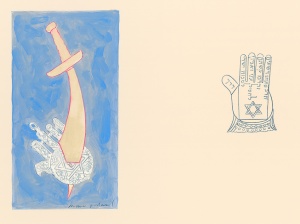“All This Has Come Upon Us…” – Mark Podwal at Terezin Ghetto Museum
“Sanctuary, sanctuary sanctuary…” proclaims Quasimodo as he rescues Esmeralda, the gypsy girl unjustly accused of murder, and whisks her into the protection of the looming Notre Dame Cathedral in Paris. The 1939 film, Hunchback of Notre Dame, starring Charles Laughton and Maureen O’Hara, is surprisingly shot through with veiled references to the plight of the Jews in Europe. The notion of the church as a place of refuge is a major theme, regardless of the historical irony. Sanctuary is simultaneously a place of holiness in which it is forbidden to enter; and a place of protection for all. Needless to say, sanctuary reverberates throughout the ages in our synagogues and communal history. The current exhibition of Mark Podwal’s artwork at the Terezin Ghetto Museum in the Czech Republic reflects an engagement of the Sanctuary motif.
Sanctuary is a place of refuge, solace and protection that easily functions as a mental as well as physical state. Mark Podwal’s (markpodwal.com) latest series of artworks provides a kind of summation of a lifetime of mournful contemplation of Jewish history; a chilling chronicle of Jewish misfortune tempered by the balm of the Book of Psalms and his elegant artworks. The timing of the release of these works surely reflects the growing apprehension that the world only grows more dangerous for the Jewish state and especially urgent for the threatened European Jewish communities. History has seldom been so relevant.
Podwal has chosen 40 historical moments in chronological order to unite verses from Psalms with his images that focus on the threats of historical anti-Semitism. The collection is currently on exhibition at the Terezin Ghetto Museum until July and the originals (or Giclee Archival Print Limited Edition) will be shown at other museums in the Czech Republic in the near future.
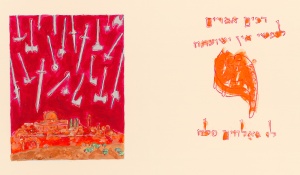
After surveying the “evil speech” of Pharaoh, the abominations of Antiochus and pain of Exile; Podwal considers the The Holy City 1099, the First Crusade’s capture of Jerusalem that resulted in “the massacre of Muslims in their mosque and the burning of Jews in the main synagogue.” The chilling text of Psalm 3:3 “The great say of my soul, ‘There is no salvation for him from God, Selah!’” reflects the heavenly onslaught of swords, battle axes and other instruments of war falling on the Holy City against a blood red sky. We didn’t have a chance.
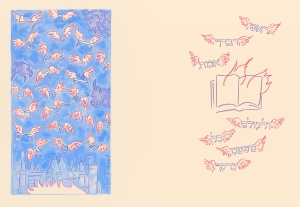
Seemingly not content with actually killing Jews, Christians waged a constant battle against the Oral Law, climaxing with burning of the Talmud at the order of Pope Gregory IX in Paris in Letters Soaring 1240 (actually carried out in June 1242). Our anguish is expressed against a deceptively pacific blue sky over a city’s medieval towers; Hebrew letters are borne aloft with little angel wings overseen by three purplish medieval gargoyles. Podwal’s image of course reflects the Talmudic tale in Avodah Zarah 18a of the execution of Rabbi Hanina burned with a Torah scroll in which he declares, “the parchment is burning but the letters are soaring on high.” On the facing page is the haunting Hebrew text, similarly winged around a burning book: “Your first utterance is truth, and Your every righteous ordinance is for all time” (Psalm 119:160). Podwal forces us to confront that generation after generation (this image spans over 1000 years) we acknowledge God’s incomprehensible justice with a stubborn faith.
Fez 1465 was no exception to the persistent Jew hatred “when the Sultan appointed a Jew as Prime Minister, the town revolted. The Sultan and his Minister were assassinated and the Jews massacred.” The image of an Islamic sword piercing a hamsa well reflects the Psalm 37:14: “The wicked drew a sword and bent their bows, to bring down the poor and the destitute, to slaughter those of upright ways.” The hamsa as a protective amulet, first known among the Arabs as the hand of Fatima, Muhammed’s daughter, is here ironically both the bearer of the Hebrew excoriation and its victim, perhaps alluding to the self-destructive nature of anti-Semitism.
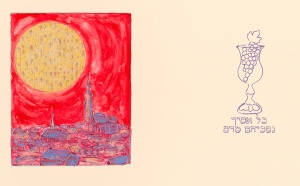
Podwal’s complex combination of images and Hebrew text results in considerably unique understandings of the simple list of anti-Semitic episodes. He refuses to flinch from our painful history, perhaps finding a kind of solace in the consistency of irrational enmity directed against us. Blood Libel Polna 1899 depicts the distinctive church towers of the central Czech town that was the site of an infamous blood libel concerning the murder of 19 year old Christian girl. While the falsely accused Jew was convicted but never executed, in Podwal’s image a red stain hangs over the town framing a hovering matzah, the horrific “substance” of the accusation. The verse (Psalm 16:4) “I shall not pour their libations of blood,” is radically reinterpreted to reflect God’s mercy on the Jews of Polna, refusing to allow their blood to be shed. Significantly the psalm begins with the supplication; “Protect me O God, for I have sought refuge in You,” providing the opening for Podwal’s optimism in the face of the scourge of the blood libel.
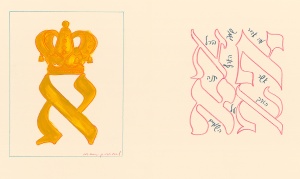
Ultimately Podwal’s deep and abiding faith comes through in the letter “aleph” crowned in Praise. Psalm 8:2 declares “How majestic is Your name throughout the earth” and the might and glory of the Holy Name that encapsulates that which is unnamable, unknowable and ineffable is coronated as the beginning, the aleph, of all creation. The entire verse clusters around 4 iterations of the first Hebrew letter, linking majesty and might with the foundation of the universe.
Sanctuary is the means by which God’s holiness can dwell with and become accessible to us. It is the refuge God gives us in times good and bad. Our experiences of the trials of ever present anti-Semitism send us to the bastions of blind faith as well as the depths of despair. And yet we return, to the Holy One, in His sanctuary.
